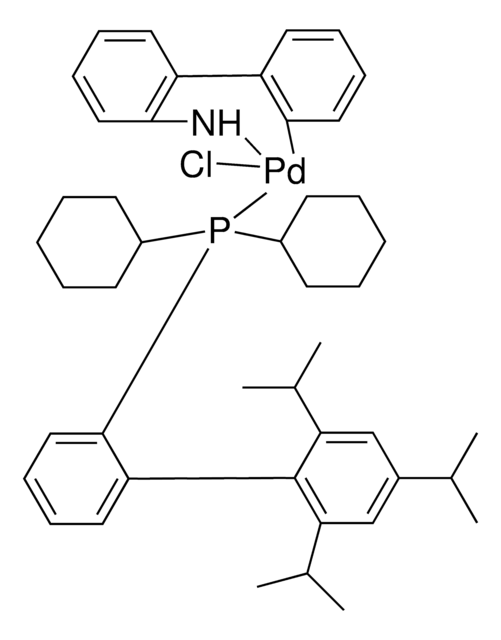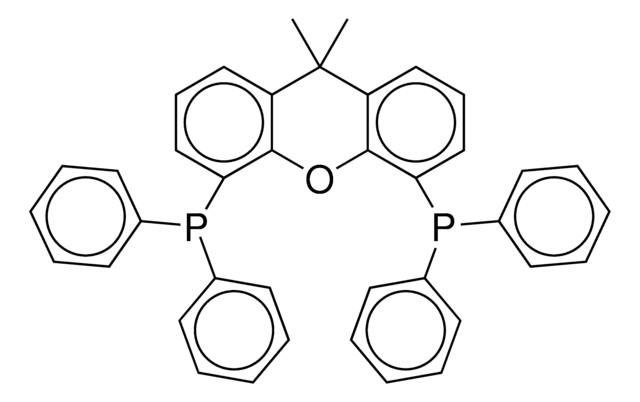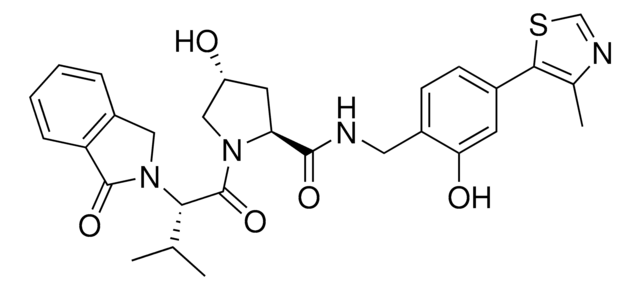928364
XPhos ChemBeads
Synonym(s):
2-Dicyclohexylphosphino-2’,4’,6’-triisopropylbiphenyl
About This Item
Recommended Products
Assay
~6 wt.% loading of catalyst
Quality Level
form
solid
reaction suitability
reagent type: catalyst
reaction type: Cross Couplings
extent of labeling
~6 wt. % loading of catalyst
InChI
1S/C33H49P/c1-23(2)26-21-30(24(3)4)33(31(22-26)25(5)6)29-19-13-14-20-32(29)34(27-15-9-7-10-16-27)28-17-11-8-12-18-28/h13-14,19-25,27-28H,7-12,15-18H2,1-6H3
InChI key
UGOMMVLRQDMAQQ-UHFFFAOYSA-N
General description
For larger scale uses, product also available in powdered form (638064)
Application
- Preparation of functionalized benzylic sulfones via palladium-catalyzed Negishi cross-coupling between alkyl sulfones and aryl halides.
- Along with pre-milled palladium(II) acetate as a pre-catalyst for the Stille cross-coupling of aryl chlorides with tributylarylstannanes to form the corresponding biaryl compounds.
- Along with platinum chloride to catalyze the hydrosilylation of terminal arylalkynes with silanes to form functionalized β-(E)-vinylsilanes.
- Ligand used in a Pd-catalyzed Suzuki coupling leading to C-15 analogs of vindoline.Direct annulation of 2-haloanilines to indoles and tryptophans catalyzed by Pd. Synthesis of regioregular polythiophenes.
ChemBeads are chemical coated glass beads. ChemBeads offer improved flowability and chemical uniformity perfect for automated solid dispensing and high-throughput experimentation. The method of creating ChemBeads uses no other chemicals or surfactants allowing the user to accurately dispense sub-milligram amounts of chemical.
Other Notes
Versatile Methods to Dispense Sub-Milligram Quantities of Solids using Chemical Coated Beads for High-Throughput Experimentation
ChemBead Enabled High-Throughput Cross-Electrophile Coupling Reveals a New Complementary Ligand
related product
Signal Word
Danger
Hazard Statements
Precautionary Statements
Hazard Classifications
Carc. 1B Inhalation
Storage Class Code
6.1D - Non-combustible acute toxic Cat.3 / toxic hazardous materials or hazardous materials causing chronic effects
WGK
WGK 3
Choose from one of the most recent versions:
Certificates of Analysis (COA)
Sorry, we don't have COAs for this product available online at this time.
If you need assistance, please contact Customer Support.
Already Own This Product?
Find documentation for the products that you have recently purchased in the Document Library.
Articles
ChemBeads, catalyst-coated glass beads, dispense solid chemical reagents for nanomole-scale high-throughput reaction screening.
ChemBeads, catalyst-coated glass beads, dispense solid chemical reagents for nanomole-scale high-throughput reaction screening.
ChemBeads, catalyst-coated glass beads, dispense solid chemical reagents for nanomole-scale high-throughput reaction screening.
ChemBeads, catalyst-coated glass beads, dispense solid chemical reagents for nanomole-scale high-throughput reaction screening.
Our team of scientists has experience in all areas of research including Life Science, Material Science, Chemical Synthesis, Chromatography, Analytical and many others.
Contact Technical Service








